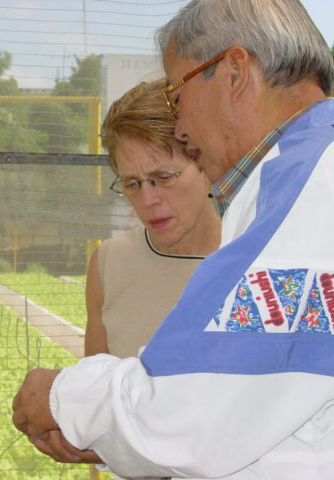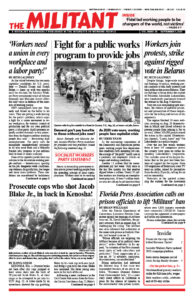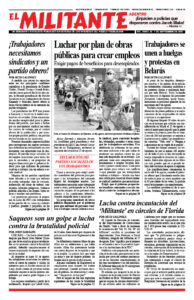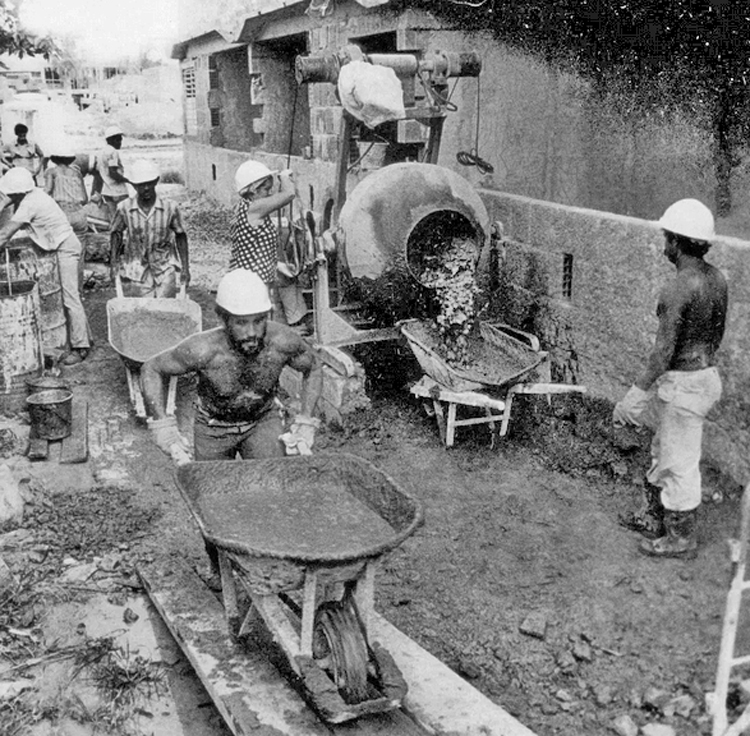The following talk by Mary-Alice Waters was given in response to an invitation to take part in an online Celebration of the Life of Fidel Castro Aug. 13. Waters is a member of the Socialist Workers Party National Committee and president of Pathfinder Press. She has edited or written some 30 books on the Cuban Revolution and its communist example. A news article appears on the facing page. Waters’ remarks are copyright © Pathfinder Press 2020, reprinted by permission.
BY MARY-ALICE WATERS
Fidel Castro’s leadership of the toilers of Cuba and the world is unlike that of any other man or woman in the twentieth or twenty-first centuries. With one exception. That is Vladimir Lenin, the principal leader of the Bolshevik Revolution of October 1917 in Russia. The central leaders of the two great socialist revolutions of the twentieth century stand apart from all others.
The respect Fidel enjoyed was unparalleled both because it was earned and never abused, and because Fidel earned it by shouldering leadership responsibility over decades of class combat.
Fidel used the trust he enjoyed not simply to administer but to lead — to lead politically. He was famous — some, of course, would say infamous — for his speeches lasting many hours, presented to assemblies of hundreds of thousands of Cuban working people, who hung on every word, sometimes under blazing tropical sun or torrential rain.
That rapport between Fidel and the toiling masses of Cuba, normal women and men, was something the revolution’s enemies were never able to comprehend. In those moments, Fidel drew from his own experience and understanding of the laws of history, of science and of the class struggle in order to broaden the horizons of the Cuban masses — the real meaning of the word “culture.” He led them to recognize themselves as actors not subjects — changers of the world, not victims of it, accomplishing what others deemed impossible.
He awakened them to “their worth” — to use the words of Malcolm X. To what they were and are capable of achieving, but only by fighting together, with discipline and class consciousness.
Transform themselves in struggle
Most important was Fidel’s ability to convey to the working people of Cuba — and to all of us — what we need to be willing to confront and change in ourselves in order to organize and fight effectively against a powerful ruling class and its spokespeople, who try to teach us the opposite. Those who try to convince us that our worth and capacities are so limited that we must accept the exploitation, oppression and compulsion on which the maintenance of capitalist rule depend. That we must submit to its dog-eat-dog norms.

The devastation facing working people the world over — precipitated by the coronavirus pandemic, which sharply accelerated the already deepening capitalist crisis — serves to underscore the fact that the Cuban Revolution cannot be reduced to the example it sets in the fields of health care and education. Its working people and government uphold those human rights. And they uphold them in practice, not just in words, as Ambassador Vidal1 explained so well.
As we see our loved ones condemned to die alone in nursing-centers-turned-death-chambers, as well as in overwhelmed hospital wards, however, we are taught once again that health and education are class questions. They register the values of the ruling class, the class that holds state power.
Cuba’s example today is possible only because of the revolutionary socialist victory conquered sixty years ago by Cuban working people under Fidel’s leadership. That, above all, is why we pay tribute to him tonight.
Rectification, political consciousness
There have been many moments over the decades when Fidel’s leadership of the Cuban Revolution was decisive. Each of us might pick a different one. But no turning point was more important than 1986 when Fidel, at the third congress of the Cuban Communist Party, initiated what became known as the Process of Rectification of Errors and Negative Tendencies.
That historic effort over a period of five years remobilized, and remoralized, Cuban working people across the island, as they enthusiastically volunteered for work brigades that built tens of thousands of homes, clinics, schools, child care centers and much more. In doing so, they proved to themselves that they could reverse the erosion of political confidence that had accompanied spreading reliance on forms of capitalist administrative methods copied from what was falsely labeled “actually existing socialism.”2
The accomplishments in Cuba during those years were inseparable from the confidence that made possible the historic victory of Cuito Cuanavale and the defeat of the South African apartheid regime.3
But not only that.
The conquests of the Rectification process were equally decisive in the capacity of the Cuban toilers to confront and overcome the hardships of the Special Period of the 1990s, when many around the world had come to believe that Cuba and its leadership were simply tropical versions of what had long existed in the Soviet Union — and would suffer a similar fate.4
In her opening remarks this evening, the chairperson quoted Fidel’s words to the closing session of the 2016 congress of the Cuban Communist Party. I want to point to another passage from that brief talk, given only a few months before his death. Fidel posed a question to the delegates: “Why did I become a socialist, or more plainly, why did I become a communist?”
It was not simply from studying books, he answered. He went on, sketching a few of the pressing crises facing humanity today, including the expanding deserts and droughts across Africa and especially the “destructive power of modern weaponry,” which “could make human life on earth’s surface impossible.”
On this seventy-fifth anniversary of US imperialism’s barbarous atomic bombing of Hiroshima and Nagasaki, Fidel’s words couldn’t be more timely.
“We have never considered producing nuclear weapons,” Fidel had told a gathering at the University of Havana in 2005. “It would mean joining the game of nuclear confrontation.”
And this decision, he added, is not because the revolution faces no enemies or military threats.
The reason, Fidel said, is that we already “possess a weapon as powerful as nuclear power, and that is the immense justice for which we are struggling.”
“Who are you going to use [a nuclear weapon] against?” Fidel asked in a book-length interview, first published in 2006. “Against the American people? No! That would be unfair and absurd.” For a country in conflict with US imperialism, he said, “A nuclear weapon is a good way to commit suicide at a certain point.”
But “there is one weapon we haven’t renounced,” and will not, Fidel said in that interview. That is the “war of the entire people.”5
‘Never renounce what we’ve won’
I’ll end on one point.
Several weeks before the 2016 Cuban Communist Party congress, Fidel had penned a powerful reply to then US president Barack Obama, who had told the Cuban people at the close of his March 22 speech in Havana that “it is time now for us to leave the past behind.”
“I suppose all of us were at risk of a heart attack upon hearing these words,” Fidel wrote. “Leave the past behind” … after Washington’s unrelenting economic war against the Cuban people for six decades, “mercenary attacks on Cuban ships and ports, an airliner full of passengers blown up in midair, mercenary invasions, multiple acts of violence and coercion.”
Fidel continued:
“Nobody should be under the illusion that the people of this dignified and selfless country will renounce the glory, the rights, or the spiritual wealth they have gained with the development of education, science, and culture.”
Our strongest tribute to Fidel this evening is to affirm that supporters of the Cuban Revolution around the world, in whatever country we find ourselves, will be guided by the course embodied in those words.
- Josefina Vidal, Cuba’s ambassador to Canada, had spoken earlier.
- Instead of the “many manuals” from the Soviet Union and elsewhere being used in Cuba to help guide the organization of economic and social relations, Fidel Castro in October 1987 urged Cubans to read a new book entitled The Economic Thought of Ernesto Che Guevara. Che’s views, Fidel said, had been “largely ignored in our country” for too many years and were “different from many paths already taken.” Che “was radically opposed to using and developing capitalist economic laws and categories,” Fidel said. “He advocated something I have often insisted on: Building socialism and communism is not just a matter of producing and distributing wealth but is also a matter of education and consciousness.” As Fidel had said many times, “Building socialism is the task of free men and women.” The book Fidel was recommending is published under the title Che Guevara: Economics and Politics in the Transition to Socialism by Carlos Tablada.
- In 1988, during the battle of Cuito Cuanavale, a crushing military defeat was dealt to the South African apartheid regime by a combined force of Cuban internationalist volunteer combatants and those from Angola and Namibia. The U.S.-backed white supremacist regime had invaded Angola in late 1975 soon after it had won its freedom from Portuguese colonial rule, and the Cuban leadership responded to the newly independent government’s appeal for international help in resisting the assault. Some 425,000 Cubans volunteered for duty in Angola between 1975 and 1991, helping to secure the country’s sovereignty, win Namibia’s independence and give a powerful boost to the overturn of apartheid in South Africa.
- With the fall of the Soviet Union and its allied regimes in Eastern and Central Europe at the opening of the 1990s, Cuba confronted an abrupt collapse of 85 percent of its foreign trade.
- Fidel Castro, My Life (Simon & Shuster, 2006, 2007).


